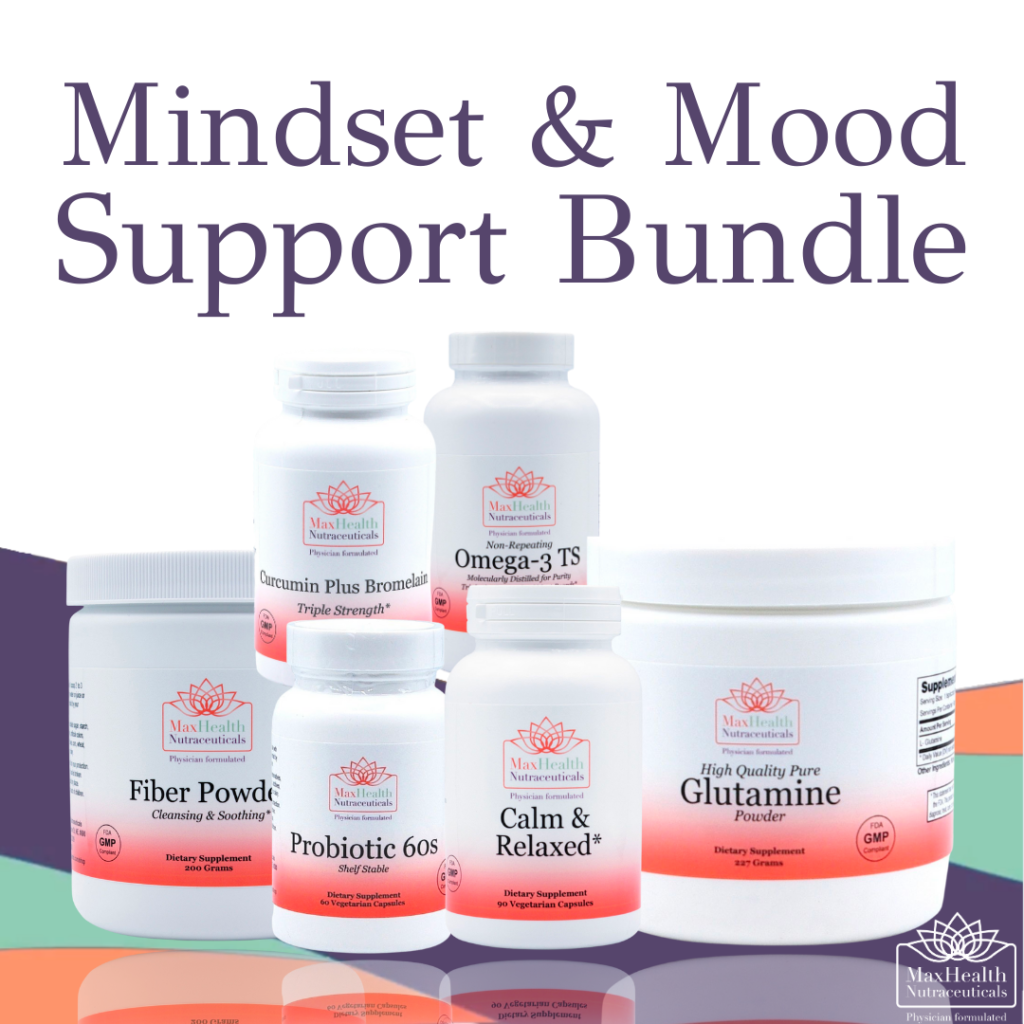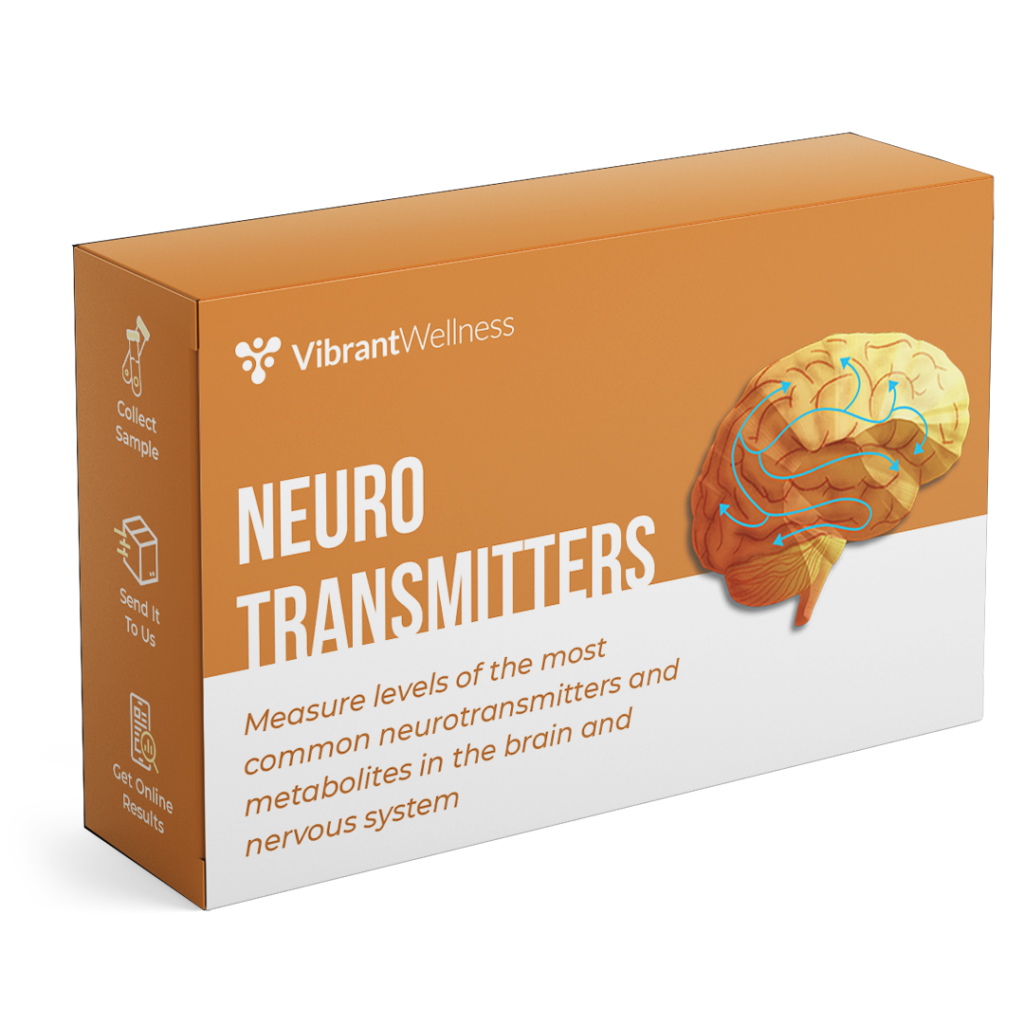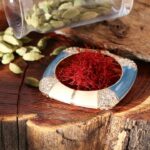
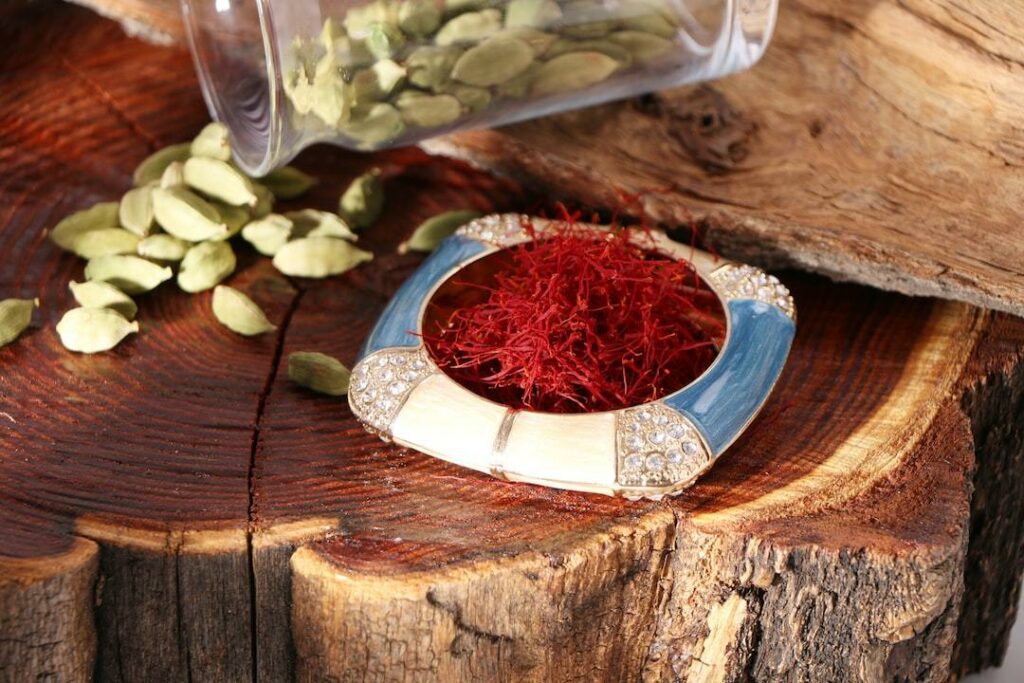
As a saffron antidepressant alternative gains traction in the world of mental health, it’s important to understand its potential benefits and how it compares to conventional treatments. We’ll explore how saffron’s properties may offer a viable alternative to traditional antidepressants, with fewer side effects and potential applications for treating antidepressant-induced sexual dysfunction and restless genital syndrome (RGS).
We’ll also explore recent studies that have shown promising results when using saffron as an alternative therapy for treating antidepressant-induced sexual dysfunction. Additionally, we’ll touch upon restless genital syndrome (RGS), another condition linked to antidepressants, and examine low-power laser therapy as a possible solution.
Lastly, we will provide valuable insights on lifestyle changes that can help minimize reliance on medications while improving overall mental health. By understanding these various aspects surrounding the use of a saffron antidepressant alternative, you can make informed decisions about your approach to managing depression and related disorders.

Minimize Medications. Maximize Health.
Are you super busy but need to take control of your health? Are you tired of being tired? Subscribe to my “Minimize Medications, Maximize Health Blog” and I’ll give you 7 Tips to Get Healthy in No Time absolutely FREE.
You have Successfully Subscribed!
Antidepressants and Sexual Side Effects
It’s no secret that antidepressant medications can be a lifesaver for many people struggling with depression. However, it’s well-documented that these medications can cause sexual dysfunction in a significant portion of those taking them – up to 70% according to some studies. In fact, up to 70% of individuals taking common antidepressants report experiencing issues such as erectile dysfunction, decreased libido, or delayed ejaculation. Let’s dive into the types of antidepressants linked to sexual side effects and explore the psychological impact they may have on those affected.
Common Types of Antidepressants Linked to Sexual Dysfunction
Selective serotonin reuptake inhibitors (SSRIs) are among the most commonly prescribed antidepressant medications, including popular options like Prozac, Zoloft, and Paxil. SSRIs, by increasing serotonin levels in the brain, can interfere with normal sexual function and are thus linked to sexual dysfunction.
- Prozac (fluoxetine): One study found that approximately 60% of patients experienced some form of sexual dysfunction while taking this medication.
- Zoloft (sertraline): Another SSRI known for its potential negative impact on libido and arousal.
- Paxil (paroxetine): This drug has been reported to cause significant difficulties achieving orgasm in both men and women.
In addition to SSRIs, other classes of antidepressants such as tricyclics (e.g., Elavil) and monoamine oxidase inhibitors (e.g., Nardil) have also been linked to sexual side effects, albeit less frequently.

The Psychological Impact of Sexual Side Effects
Dealing with the emotional turmoil of depression is already challenging enough. Coping with depression is tough, and the shame and disappointment of sexual dysfunction can add to feelings of anxiety or self-doubt. The psychological impact of these side effects should not be underestimated:
- Relationship strain: For couples where one partner is dealing with antidepressant-induced sexual dysfunction, it can lead to feelings of guilt or inadequacy on both sides – potentially causing tension within the relationship.
- Anxiety about performance: Men who experience erectile dysfunction as a result of their medication may develop performance anxiety, further compounding their difficulties in achieving an erection.
- Frustration and low self-esteem: Both men and women affected by these side effects may feel frustrated by their inability to fully enjoy intimate moments with their partners, leading to lower self-esteem over time.
In light of these challenges, many individuals are seeking alternative treatment options for managing depression without sacrificing their sex lives. One promising candidate? Saffron – a natural spice that has shown potential as an effective antidepressant alternative while avoiding some common pitfalls associated with traditional medications. Stay tuned for more information on saffron’s role in treating depression and its potential benefits for those struggling with antidepressant-induced sexual dysfunction.
The sexual side effects of antidepressants can be a difficult reality to face, but there are alternatives available. Saffron has been studied as an alternative treatment for depression and may offer some relief from the symptoms without causing any additional unwanted consequences.
Key Thought:
Antidepressants can cause sexual dysfunction, with up to 70% of users experiencing issues such as erectile dysfunction or decreased libido. Selective serotonin reuptake inhibitors (SSRIs) are among the most commonly prescribed antidepressants linked to these side effects, but saffron may offer a natural alternative for managing depression without sacrificing one’s sex life.
Saffron as an Alternative Treatment for Depression
Are you tired of the same old antidepressants and their side effects? Let’s dive into the world of saffron, a potential game-changer in depression treatment. Recent studies have shown that this golden spice may be an effective alternative option for managing symptoms of depression, anxiety, and general psychological distress. In fact, saffron has been found to significantly outperform placebo or even rival traditional antidepressant medications in five separate studies. So let’s explore the properties and benefits of this miraculous herb.
Overview of Saffron’s Properties and Potential Benefits
Saffron (Crocus sativus), known for its vibrant color and unique flavor, is more than just a culinary delight. It contains powerful antioxidants such as crocin, crocetin, picrocrocin, and safranal that are believed to contribute to its therapeutic effects on mood disorders. These compounds work together to protect brain cells from oxidative stress while also modulating neurotransmitters like serotonin – which plays a crucial role in regulating our mood.
- Crocin: A carotenoid pigment responsible for saffron’s rich color; exhibits antioxidant properties that help combat inflammation associated with depressive symptoms.
- Crocetin: Another carotenoid compound found in saffron; helps improve blood flow within the brain by reducing oxidative stress.
- Picrocrocin: The main glycoside present in saffron; contributes to both taste enhancement as well as possible neuroprotective effects against degenerative diseases like Alzheimer’s disease.
- Safranal: A volatile oil component of saffron; has been shown to possess antidepressant-like effects in animal studies.
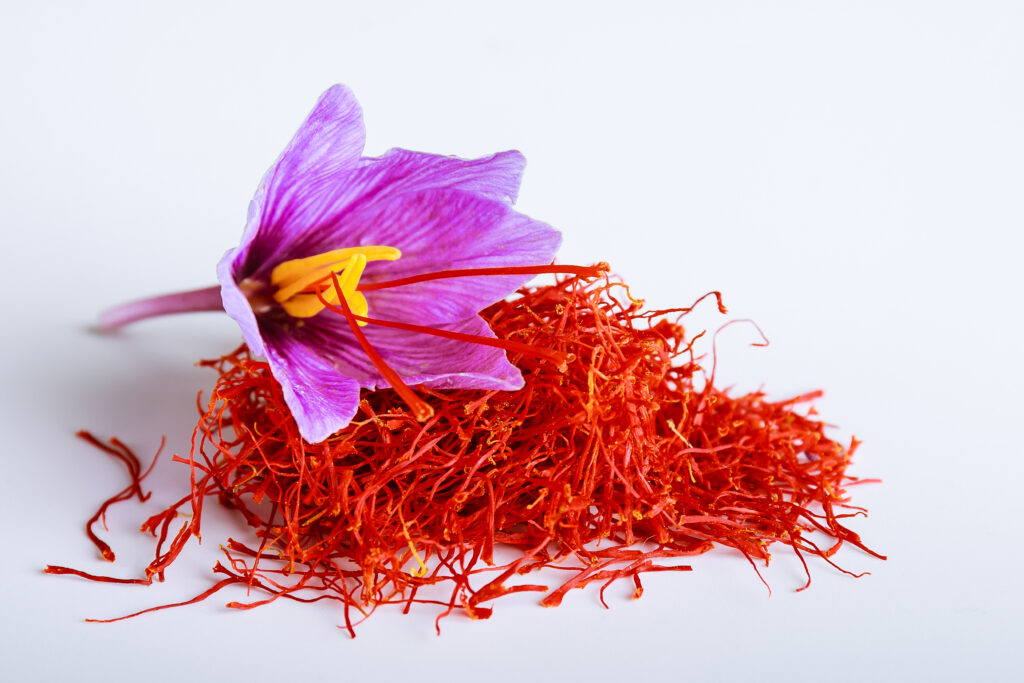
Comparison between Saffron and Conventional Treatments in Clinical Trials
Having explored the benefits of saffron, we can now assess how it compares to traditional treatments for depression in clinical trials. In one study, participants diagnosed with mild-to-moderate depression were randomly assigned to receive either 30 mg of saffron extract or a common antidepressant (fluoxetine) daily for six weeks. The results? Both groups saw improvements in their symptoms of depression, with no real distinction between them – indicating that saffron might be just as effective as fluoxetine.
In another clinical trial, researchers compared the efficacy of saffron supplementation versus placebo on patients suffering from major depressive disorder (MDD). After eight weeks, those who received the saffron supplement showed significantly greater reductions in their Hamilton Depression Rating Scale scores than those taking a placebo.
A meta-analysis further supports these findings by reviewing six randomized controlled trials involving 230 adult participants with MDD. The analysis concluded that “saffron supplementation can improve symptoms of depression,” adding weight to its potential role as an alternative treatment option.
All this evidence points towards an exciting possibility: Saffron could very well be our next go-to natural remedy for managing mood disorders without resorting to traditional medications and their side effects. So why not give this golden spice a try and see if it can brighten up your life?
Further research is needed to investigate the efficacy of saffron as a potential treatment for depression. Moving on from this overview of saffron’s properties, we can now look at how it may help those suffering from antidepressant-induced sexual dysfunction.
Key Thought:
Saffron has been found to be an effective alternative option for managing symptoms of depression, anxiety, and general psychological distress. Its powerful antioxidants protect brain cells from oxidative stress while also modulating neurotransmitters like serotonin – which plays a crucial role in regulating our mood. Saffron could very well be the next go-to natural remedy for managing mood disorders without resorting to traditional medications and their side effects.
Saffron’s Role in Treating Antidepressant-induced Sexual Dysfunction
Searching for a remedy to depression that doesn’t come with unfavorable consequences can be quite the endeavor. Enter saffron, a spice derived from the Crocus sativus plant, which has been used for centuries in Eastern medicine and is now making waves as an alternative treatment option for those suffering from depressive disorders. But wait – there’s more. Saffron may also play a role in addressing sexual dysfunction caused by conventional antidepressants.
Details on How the Study Was Conducted
Intrigued? Let us dive into this fascinating study that explored saffron’s potential benefits for men experiencing Prozac-induced sexual impairment. Researchers randomly assigned participants to two groups: one receiving 30 mg of saffron per day (a slightly higher dose than typically found in culinary uses) and another group given a placebo. For the duration of four weeks, researchers evaluated erectile function and intercourse satisfaction with standardized tests such as IIEF and BDI-II.
Possible Mechanisms Behind These Improvements
The results were nothing short of impressive. Participants who received daily saffron supplementation experienced significantly greater improvements in both erectile function and intercourse satisfaction compared to their placebo-taking counterparts. So how does this golden-hued spice work its magic?
- Main active saffron constituent: Crocin is considered one of the primary active compounds in saffron and has been shown to have potent antioxidant properties. This may help combat oxidative stress, which is thought to play a role in the development of sexual dysfunction.
- Neurotransmitter modulation: Saffron’s antidepressant effects are believed to be partially due to its ability to modulate neurotransmitters such as serotonin, dopamine, and norepinephrine – all of which also play a crucial role in regulating sexual function. By balancing these chemicals within the brain, saffron may help alleviate both depression symptoms and related sexual side effects.
- Nitric oxide production: Nitric oxide (NO) is essential for healthy blood flow and erectile function. Some studies suggest that saffron can increase NO production, thereby improving penile blood flow and overall erectile performance.
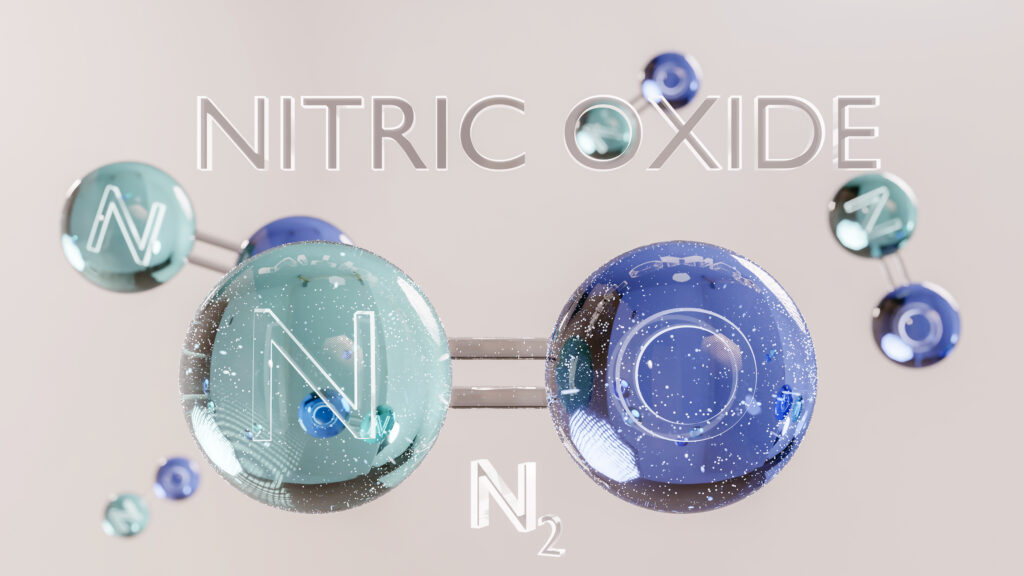
In light of these findings, it seems that our ancestors were onto something when they incorporated this vibrant spice into their traditional healing practices. While more research is needed before we can definitively crown saffron as an all-in-one solution for treating depression and associated sexual dysfunction issues, it certainly shows promise as an alternative or complementary therapy worth considering.
A Word of Caution: Quality Matters.
When looking to use saffron for mental or sexual health, be sure to purchase a high-quality product from a reliable source. As with any herbal medicine, the potency and effectiveness of saffron can vary greatly depending on factors such as cultivation practices, processing methods, and storage conditions. Do your homework to ensure you’re getting the real deal – your mind and body will thank you.
Saffron, with its effects on serotonin and dopamine levels, may offer relief from antidepressant-induced sexual dysfunction symptoms. Additionally, low-power laser therapy is another promising option for managing restless genital syndrome (RGS) caused by the use of antidepressants.
Key Thought:
Saffron, a spice used in Eastern medicine for centuries, is gaining attention as an alternative treatment option for depression and sexual dysfunction caused by conventional antidepressants. A study showed that daily saffron supplementation can significantly improve erectile function and intercourse satisfaction due to its antioxidant properties, ability to modulate neurotransmitters, and increase nitric oxide production. However, it’s important to choose a high-quality product from a reputable source before trying it out.
Restless Genital Syndrome (RGS) Induced by Antidepressants
If you thought sexual side effects from antidepressants couldn’t get any stranger, let us introduce you to restless genital syndrome (RGS). RGS is a condition where individuals experience persistent sensations like tingling or burning in their genitals without any apparent cause. Persistent genital itching that won’t abate can be an extremely irritating experience for those who suffer from it. In some cases, this peculiar syndrome has been linked to the use of antidepressant medications.
Understanding Restless Genital Syndrome (RGS)
RGS was initially known as Persistent Sexual Arousal Syndrome (PSAS), but the name was changed because it doesn’t always involve arousal – sometimes it’s just plain discomfort. The exact cause of RGS remains unclear; however, researchers believe that nerve damage or dysfunction may play a role in its development. Some people with RGS have reported relief after stopping their antidepressant medication, while others continue to experience symptoms even after discontinuing treatment.
In one case study published in the European Journal of Pharmacology, a man developed restless genital syndrome after starting fluoxetine (Prozac) for depression management. His symptoms persisted despite trying different medications and treatments until he finally found relief through low-power laser irradiation therapy.
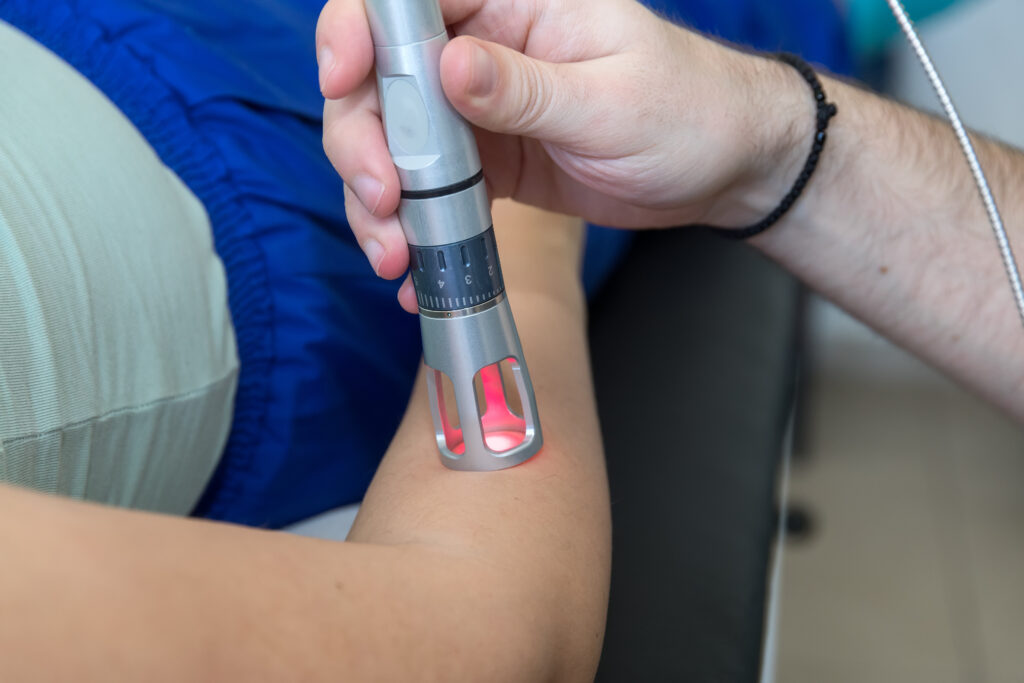
How Low-Power Laser Therapy Works Against RGS
You might be wondering how shining a laser on your nether regions could possibly help alleviate such an unusual condition. Well, low-power laser therapy works by stimulating blood flow and promoting tissue repair at the cellular level – think of it as giving your cells a little pep talk. This non-invasive treatment has been used for various conditions, including pain management and wound healing.
In the aforementioned case study, the patient underwent 20 sessions of low-power laser therapy over four weeks. He reported a significant improvement in his symptoms but still couldn’t perform to his girlfriend’s satisfaction. While this is just one example, it highlights the potential benefits of exploring alternative treatments when conventional methods fail to provide relief from medication-induced side effects like RGS.
Other Treatment Options for Restless Genital Syndrome
If you’re struggling with RGS induced by antidepressants and lasers aren’t your thing (or if they don’t work), there are other options worth considering:
- Medication adjustments: Discussing your symptoms with your healthcare provider may lead to changes in dosage or switching to a different antidepressant that might alleviate RGS symptoms.
- Pelvic floor physical therapy: A specialized form of physical therapy focusing on pelvic muscles can help address nerve dysfunction and improve blood flow in the genital area, potentially providing relief from RGS symptoms.
- Mindfulness techniques: Practices such as meditation, deep breathing exercises, or progressive muscle relaxation can help manage stress and anxiety related to persistent genital sensations.
The bottom line? If you’re experiencing restless genital syndrome due to antidepressant use – or any other reason – don’t suffer in silence. Speak up about your concerns with your healthcare provider so that together you can explore all available treatment options and find what works best for you.
Restless genital syndrome (RGS) induced by antidepressants can be treated with low-power laser therapy, but it is important to also focus on lifestyle changes that may reduce the need for medications and their side effects. In order to reduce the reliance on medication, dietary modifications and exercise should be taken into account when devising a comprehensive treatment approach.
Key Thought:
Restless Genital Syndrome (RGS) is a condition where individuals experience persistent sensations like tingling or burning in their genitals without any apparent cause, which can be linked to the use of antidepressant medications. Low-power laser therapy has been used as an alternative treatment for RGS by stimulating blood flow and promoting tissue repair at the cellular level. Other options include medication adjustments, pelvic floor physical therapy, and mindfulness techniques such as meditation or deep breathing exercises to manage stress and anxiety related to persistent genital sensations.
Lifestyle Changes to Minimize Medications and Side Effects
While it’s tempting to rely solely on medications for treating depression, making key lifestyle changes can significantly improve mental health and potentially reduce the need for antidepressants. Focusing on self-care can help to reduce reliance on medications that may bring about undesired sexual effects and improve one’s quality of life.
Dietary Recommendations for Improving Mental Health
A healthy diet plays a crucial role in maintaining optimal mental health. Certain foods have been found to impact mood positively by providing essential nutrients required for proper brain function. Here are some dietary recommendations:
- Omega-3 fatty acids: Found in fish like salmon, mackerel, and sardines, as well as nuts and seeds such as walnuts and flaxseeds; these fats help support brain function.
- B vitamins: Crucial for cognitive health; sources include whole grains, legumes (beans), leafy greens (spinach), poultry (chicken), and dairy products.
- Magnesium-rich foods: Magnesium is involved in various processes affecting mood regulation; examples include dark chocolate (yes!), almonds, avocados, and bananas.
- Fruits and vegetables: Aim to consume at least five servings per day – they provide antioxidants which combat inflammation linked with depressive disorders.

The Impact of Physical Activity on Depression Management
In addition to a healthy diet, regular physical activity is an effective way of managing depressive symptoms naturally and can help release endorphins that promote positive moods. Physical activity can generate endorphins, the “happy” hormones in our brains, which may help lift spirits and reduce anxiety. Here are some tips to incorporate exercise into your daily routine:
- Start small: If you’re new to exercising or haven’t been active for a while, begin with low-impact activities like walking or swimming.
- Choose enjoyable activities: Pick exercises that appeal to you; this will increase the likelihood of sticking with it long-term.
- Schedule workouts: Make time for physical activity by adding it to your calendar as an appointment – treat it just as importantly as any other commitment.
Besides these lifestyle changes, incorporating alternative therapies such as yoga and meditation can also help manage depression symptoms. For instance, practicing mindfulness techniques has been shown to reduce anxiety levels and improve overall mental well-being. It’s essential not only to consider medications but also explore various integrative therapies when addressing depressive disorders.
Incorporating healthy habits like proper nutrition and regular exercise may even enhance the effectiveness of conventional antidepressants or herbal medicines like saffron. By taking control of your health through these lifestyle modifications, you can minimize medication use while maximizing your overall well-being – a win-win situation.
Key Thought:
Making lifestyle changes such as a healthy diet and regular exercise can significantly improve mental health and potentially reduce the need for antidepressants. Incorporating alternative therapies like yoga, meditation, or saffron can also help manage depression symptoms while enhancing overall well-being. It’s essential to take control of your health through these modifications to minimize medication use and maximize quality of life – a win-win situation.
I would love to give you a free resource sheet to support your quest for a healthy mindset. Click the button below to receive your gift.
I really wanted to talk about this topic today because I wanted to share some lifestyle-based strategies to improve your overall mindset and mental health, which in turn improves your life. You must do the internal work to improve your overall health. You can do this by learning what motivates you and working each day on improving your mindset. Your thoughts control your feelings, which controls your behavior. You can cultivate certain behaviors and practices that will not only enrich your life, but that you can pass on to your family, friends, and community, so that you can leave a legacy of health to your loved ones.
If you are familiar with my approach, I use functional medicine and lifestyle medicine as the first line of treatment, before medications, to treat lifestyle-related chronic diseases. Lifestyle-related chronic diseases include diabetes, hypertension, obesity, some cancers, just to name a few. Lifestyle modifications, such as stress reduction and mindfulness exercises, can help you feel better about yourself and your life. In certain cases, these approaches may even outperform pharmaceutical therapy. But I always tell my patients that conventional medications may be appropriate at this time to prevent catastrophic illness, but over time, you can work to make the necessary lifestyle changes to possibly reduce and/or eliminate medications. Please remember to always consult your physician for your particular needs and circumstances prior to making any decisions whatsoever.
Is Dietary Supplementation Right For You?
Did you know that what you eat can have a significant impact on your mood and mindset? A poor diet can lead to decreased energy levels, low moods, and even depression. Conversely, a healthy diet can improve your mood, help you feel more energetic, and boost your overall sense of well-being.
For some people, vitamin and mineral supplements offer important health benefits. Supplements are designed to fight deficiencies found in our diet and complement the food we eat regularly. Supplements are basically “helping hands” to our daily food.
When stress, anxiety, and depression creep in, it can be difficult to stay motivated and keep your head in the game. Fortunately, dietary supplementation can help. Certain vitamins, minerals, herbs and other natural ingredients have been shown to improve moods and reduce stress levels. For example, B vitamins (such as B6 and B12) are essential for maintaining healthy brain function and producing energy. Omega-3 fatty acids, which can be found in fish oil supplements, are known to reduce stress hormones and promote relaxation. Magnesium is also important for mental health – it helps regulate stress hormones, reduce anxiety levels and improve quality of sleep.
In addition to these supplements, there are also a number of herbal remedies that can help with stress management. Herbs such as lavender, chamomile and passionflower can be helpful for calming the body and reducing stress levels. Valerian root is another popular stress-relieving herb – it helps to relax the mind and promote restful sleep.
Ultimately, dietary supplementation can play an important role in improving your mindset and mood. If you’re feeling stressed or down, consider adding some of these supplements to your daily routine! They may just be the key to unlocking your mental wellbeing.
So… if you are unable to eat better and need supplementation, the supplements in my Mindset and Mood Support Bundle may provide the extra boost you need.
These are my favorite Mood Support Supplements to use! This Mindset and Mood Support Bundle will ensure you have the intake of the important vitamins, minerals, and probiotics to decrease inflammation and boost your innate wellness day and night. Taken together, it’s a solid plan for increasing your body’s natural resiliency while you improve your sleep, decrease your stress, and improve your mental clarity, naturally.
Tools For Motivation And Mindset
Meditating
Although you don’t need a cushion to meditate, you may want to consider using one at some point. You could meditate in a chair, or simply sit on the floor if you want. You can also use pillows or cushions from your furnishings to try out. Cushion, chair, bench, floor – it’s all good. Eventually, though, if you’re not sitting upright on a chair, you’ll probably do well to buy a dedicated meditation cushion. The cushion will support your sitting posture and help you create an appealing mindfulness corner that will encourage you to practice every day. I recommend this meditation cushion and mat bundle.
Journaling
If you struggle with stress, depression, or anxiety, keeping a journal can be a great idea. Even if you don’t have these conditions, journaling can enhance your life in many ways. Having difficulty processing your thoughts and emotions? Journaling can help clear that mental clutter and move towards a positive mindset. Research suggests that keeping a journal can have positive impacts on both mental and physical health. So, to start you on your journey, I recommend this self care journal.
Yoga
Yoga can be a great way to improve your strength and flexibility, manage your stress, improve your heart health, and lose weight! I recommend using a grounded yoga mat to connect yourself with the earth and reduce inflammation.
Food!
Remember, living a healthy lifestyle including eating a whole foods plant-based diet, regular physical activity, meditation and mindfulness, as well as healthy and supportive relationships are the best ways to support mental health.
Please talk with your doctor about any complementary health approaches, including supplements, you use. Let me know what you think in the comment section below.
Still Feeling A Little “Off”?
You may want to consider looking at your neurotransmitter levels. We’ve all heard of neurotransmitters—those chemical messengers that facilitate the transmission of signals from one neuron to the next across a synapse. But, what do they actually do?
Neurotransmitters influence and regulate a wide range of processes, from mental performance and emotions to pain response and energy levels. It’s no wonder why many people seek professional help when their neurotransmitter levels become imbalanced. Let’s take a closer look at how neurotransmitters work and what options are available for addressing imbalances.
What Is a Neurotransmitters Test?
The best way to determine if there’s an imbalance is through testing. The Vibrant Wellness Neurotransmitter Test is designed to measure levels of various hormones and chemicals in the brain and peripheral nervous system that play an important role in mood, memory, aging, balance, nervous function, movement, pain perception, eating behavior, sleep/wake cycles, stress biology, heart rate variability (HRV), etc. The Neurotransmitters panel measures levels of important hormones and chemicals in the brain and peripheral nervous system—including serotonin (mood), dopamine (motivation), epinephrine/norepinephrine (energy), GABA (relaxation) , glutamate (balance), acetylcholine (memory) , histamine (inflammation).
It’s also important to note that this test looks at both active levels as well as metabolites which helps identify underlying causes for imbalances such as poor absorption or metabolism. With this data in hand, you can start making changes that help restore balance.
Imbalances in these chemicals can lead to a variety of symptoms including irritability, anxiety or depression; cognitive issues such as forgetfulness; sleep disturbances; fatigue; digestive problems; low libido; weight gain or loss; etc. A Neurotransmitter test is used to detect underlying imbalances that may be causing these symptoms.
What Are the Benefits of a Neurotransmitter Test?
A neurotransmitter test can provide valuable insight into your overall health. It can identify any underlying hormonal or chemical imbalances that may be contributing to your symptoms. Once these imbalances have been identified, you can work with your healthcare provider to develop an individualized treatment plan that addresses the root cause of your symptoms. This could include lifestyle changes such as diet modifications or exercise regimens as well as supplements or medications designed to correct any deficiencies in neurotransmitter production.
What Can I Do if My Test Comes Back Positive?
If your test comes back positive for an imbalance in one or more neurotransmitters, there are several things you can do to get back on track. The first step is to identify any underlying lifestyle factors that could be contributing to the imbalance (such as sleep deprivation or poor nutrition). Once you’ve identified those factors, you can begin making changes – such as improving your diet or getting more exercise – to help restore balance. Additionally, certain supplements may also be recommended by your doctor or health care provider in order to promote optimal neurological functioning and support healthy neurotransmitter levels.
In A Nutshell…
Neurotransmitters are essential for a healthy mind and body – they influence mental performance and emotions while helping regulate key processes like pain response and energy levels. If you’re feeling off balance lately or experiencing unusual symptoms like insomnia or digestive issues it might be worth looking into whether there’s an underlying imbalance in your neurotransmitter levels causing your discomfort. A Neurotransmitters panel test will give you valuable insight into what’s going on within your body so you can take corrective action if needed! With the information gained from this test you’ll be able to better understand what’s going on within your body and make informed decisions about how best to bring yourself back into balance!
PLEASE NOTE: If you or someone you know is experiencing severe stress, anxiety, depression and/or other mental health issues, please contact SAMHSA’s National Helpline, 1-800-662-HELP (4357), (also known as the Treatment Referral Routing Service) or TTY: 1-800-487-4889. This is a confidential, free, 24-hour-a-day, 365-day-a-year, information service, in English and Spanish, for individuals and family members facing mental and/or substance use disorders. This service provides referrals to local treatment facilities, support groups, and community-based organizations. Callers can also order free publications and other information.
Saffron Antidepressant Alternative FAQs
It’s difficult to definitively say if saffron is better than traditional antidepressants, as individual responses vary greatly. Saffron has been found effective in treating mild to moderate depression with fewer side effects compared to conventional treatments like SSRIs. However, consult your healthcare provider before making any changes to your treatment plan.
Several studies suggest that saffron can help alleviate symptoms of depression in some cases. A meta-analysis found that it was significantly more effective than placebo and had similar efficacy compared to standard treatments such as fluoxetine (Prozac) or imipramine (Tofranil). More research is needed before drawing definitive conclusions.
One study found that saffron was as effective as sertraline (Zoloft) in treating mild to moderate depression, with fewer side effects. However, this is just one study and more research is needed before making a definitive comparison between the two treatments. It’s essential to consult your healthcare provider before switching medications or using saffron as an alternative treatment.
Saffron may be a viable alternative for some individuals experiencing mild to moderate depression. However, it is not recommended as a complete replacement for conventional antidepressants without consulting a healthcare professional. The effectiveness of saffron varies among individuals and depends on the severity of their condition. Clinical trials have shown promising results, but more research is needed.
Final Thoughts
Overall, the use of antidepressants can come with unwanted side effects such as sexual dysfunction and restless genital syndrome. However, saffron has shown potential as an alternative treatment for depression with fewer side effects. Clinical trials have demonstrated its effectiveness in improving symptoms and even alleviating antidepressant-induced sexual dysfunction.
In addition to considering saffron as a natural remedy, lifestyle changes such as dietary adjustments and physical activity can also aid in managing mental health without relying solely on medication.
If you’re interested in learning more about natural alternatives for treating depression or other chronic conditions, visit Dr. Nicolle’s website to schedule a consultation today!
Dr. Nicolle Martin
Some of the links in this article are "affiliate links", a link with a special tracking code. This means if you click on an affiliate link and purchase the item, we will receive an affiliate commission.
The price of the item is the same whether it is an affiliate link or not. Regardless, we only recommend products or services we believe will add value to our readers.
By using the affiliate links, you are helping support our Website, and we genuinely appreciate your support.
Last updated on May 17th, 2023 at 06:05 pm

Minimize Medications. Maximize Health.
Are you super busy but need to take control of your health? Are you tired of being tired? Subscribe to my “Minimize Medications, Maximize Health Blog” and I’ll give you 7 Tips to Get Healthy in No Time absolutely FREE.


